- Home
- Jay Bonansinga
Invasion Page 2
Invasion Read online
Page 2
Less than ten seconds have transpired since the initial impact, but now Jeremiah sees the true reason that one of the men in back has howled such a warning. It has nothing to do with the reanimated head. What they’re screaming about back there—the thing Jeremiah is supposed to look out for—is now looming on the opposite side of the highway, coming up quick on their right, closing in as they continue to skid out of control on the spoor of dead things.
Jeremiah feels gravity shift as he swerves in order to avoid the mangled wreckage of a VW Bug, scuds across the gravel shoulder, then plunges down a steep embankment into the dark unknown of a wooded grove. Pine boughs and foliage scrape and slap at the windshield as the vehicle bangs and clamors down the rocky slope. The voices in the back rise into frenzied ululations.
Jeremiah feels the land level out, and he manages to keep control of the vehicle long enough to find purchase in the mud. He slams down the accelerator and the Escalade lurches forward under its own power.
The massive grille and gigantic tires grind through the thickets, cobbling over deadfalls, mowing down wild undergrowth and tearing through scrub as though it were smoke. For seemingly endless minutes, the bumpy ride threatens to compress Jeremiah’s spine and rupture his spleen. In the blurry image of the rearview, he gets a brief glimpse of the two injured young men holding on to the seat-backs for fear of bouncing out of the vehicle. The front end hits a log, and the impact nearly cracks Jeremiah’s back molars.
For another minute or so, they career willy-nilly through the trees.
When they burst out of the brush in an explosion of dirt, leaves, and particulate, Jeremiah sees that they’ve inadvertently come upon another unidentified two-lane road. He slams on the brakes, causing the men in back to head-butt the seat-backs.
* * *
Jeremiah sits there for a second, taking deep breaths and getting air back in his lungs. He looks around. The men in back let out collective moans, settling back into their seats, holding themselves. The engine idles noisily, a rattling sound introduced to the low rumble, probably a bearing knocked loose in the improvised off-road adventure.
“Well now,” the preacher says softly. “That’s one way to take a shortcut.”
Silence from the backseat, the humor lost on the two young disciples.
Above them, the black, opaque sky is just beginning to lighten with a purple predawn glow. In the dull, phosphorescent light, Jeremiah can see enough detail now to realize that they’ve landed on an access road, and the woods have given way to wetlands. To the east, he can see the road winding through a fogbound, soupy backwater—probably the edge of the Okefenokee Swamp—and to the west, a rust-pocked sign says “State Road 441—3 mi.” No sign of roamers in either direction.
“Judging from that sign up there,” Jeremiah says, “I believe we just crossed the Florida state line and didn’t even know it.”
He puts the vehicle in gear, carefully makes a U-turn, and starts down the road in a westerly direction. His original plan—to try and find refuge in one of the larger towns along the North Florida citrus belt, such as Lake City or Gainesville—still seems viable, despite the fact that the engine continues to ping and complain. Something has come loose during the plunge through the woods. Jeremiah doesn’t like the sound of it. They need to find a place to stop soon, look under the hood, get their wounds looked at and dressed, maybe find some provisions and fuel.
“Hey! Look!” Reese speaks up from the shadows of the rear seats, pointing off to the southwest. “At the end of that lot.”
Jeremiah drives another hundred yards or so and then brings the Escalade to a stop on the gravel shoulder. He kills the engine, and silence crashes down on the Escalade’s interior. Nobody says anything at first; they just stare at the roadside sign in the middle distance. It’s one of those cheap, translucent, white-fiberglass jobs, set on wheels, with the big removable plastic letters—common in the rural U.S. outside everything from flea markets to tent revivals—this one still bearing the letters:
C-A-L-V-A-R-Y B-A-P- -I-S-T C-H-U-R-C-H
A-L-L W-E- -C-O-M
S-U-N-D-A-Y 9 - & - 11
Through the spindly cypress trees and columns of pines that line the two-lane, Jeremiah can see the luminous white gravel of a deserted parking lot. The long, narrow lot leads to the front of a slumped frame building, its broken stained glass windows partially boarded, its steeple caved in on one side and scorched as though devastated from the sky in a bombing raid. Jeremiah stares at the edifice. The huge steel cross at the top of the steeple—which is covered with a patina of rust—has come loose from its moorings.
It now lies upside down, dangling by the remaining threads of its rotted hardware.
Jeremiah stares. He gets very still, gazing up at that ruined, upended cross—the sign of satanic influence—but the symbolism of an upside-down cross is only the beginning. Jeremiah realizes that this may very well be a sign that they’ve been left behind, and this is the Rapture, and the world is their purgatory now. They must deal with what remains, like junkyard dogs, like vermin scouring a sinking ship. They must destroy or be destroyed.
“Remind me,” Jeremiah says at last, almost under his breath, not taking his eyes off the building in the distance. One of the windows in the rear has a dull yellow incandescent glow behind it, the chimney spewing a thin wisp of smoke up into the lightening sky. “How much ammunition did y’all manage to scavenge before we left Woodbury?”
In the rear seats, the two young men give each other a quick look.
Reese says, “I got one of them thirty-three-round mags for the Glock, and a box of two dozen .380s for the other pistol, and that’s it.”
“That’s more than I got,” Stephen grouses. “All I managed to grab ammo-wise was what’s in the Mossberg, which I think is like eight rounds, six maybe.”
Jeremiah picks his Glock up from the seat, counting the number of times he’s fired since they left Woodbury. He’s got six rounds left. “All right, gentlemen … I want you to bring all of it, all the hardware, locked and loaded.” He opens the door. “And look alive.”
The other two men get out of the vehicle and join the preacher in the golden light of dawn. Something is wrong. Reese notices his hands shaking as he injects the fresh magazine into the hilt of his pistol. “Rev, I don’t understand,” he says finally. “Why we loading up for bear? I doubt there’s anything in there but scared church people. What are we doing?”
The preacher has already started toward the derelict church, his Glock gripped tightly in his huge hand, dangling at his side like a calling card. “This here’s the Rapture, boys,” he murmurs casually, as though informing them it’s Presidents’ Day. “There ain’t no such thing as ‘church’ anymore. It’s all up for grabs.”
The two young men glance at each other for a moment before hurrying to catch up with the preacher.
TWO
They approach the property from the rear, through a grove of sickly eucalyptus trees that mark the outer edges of the church’s lot. Jeremiah can smell the cloying stench of menthol and ammonia in the air as he creeps across the weed-whiskered gravel, careful not to make too much noise when his big boots crunch on the pea stones. The light in the chapel’s rear window has dwindled with the advent of the morning sun, and the roar of crickets has faded. Now the silence lies like a pall over the area, making Jeremiah’s heart throb in his ears.
He pauses behind a tree about twenty-five feet away from the lighted window.
With a few quick hand signals, the preacher rouses the two younger men, who are hiding behind a nearby oak. Stephen limps as he moves out from behind cover, carrying the pistol-grip shotgun against his solar plexus like a vestigial appendage. Reese moves in behind his friend, wide-eyed and jumpy, flinching at twinges of pain. These two are not exactly the crème de la crème of the world’s new survivor class, Jeremiah realizes, nor are they the greatest disciples imaginable for a spiritual leader such as himself. But perhaps, the preacher should see these
young men as they truly are: clay to be molded in this new world, this hell on earth. As Jeremiah’s old man used to say, quoting Thessalonians 5:1, “The day of the Lord will come like a thief in the night, and while people are saying, Peace and safety, destruction will come on them suddenly, as labor pains on a pregnant woman, and they will not escape.”
Jeremiah issues another signal, stabbing a finger at the rear of the building.
One by one, the three men move in toward the small, wood-sided annex off the rear of the chapel—Jeremiah in the lead, his pistol gripped in both hands, muzzle downward. The closer they get, and the more the sun dawns over the horizon, the more they realize something isn’t right. The windows of the rear building—the rectory or the deacon’s quarters, maybe—are lined in aluminum foil. The screen door has been ripped off its spindle, and the inner door has been nailed shut and crisscrossed with lumber. The stench of walkers permeates the air, and it gets stronger as they approach.
Jeremiah reaches the building first, and he gently stands with his back against the boarded door, signaling to the others with a finger to his lips.
They approach as quietly as possible, stepping lightly over the trash and dead leaves that are skittering across the back deck on the morning breeze. Stephen stands on one side of the preacher, Reese on the other, both keeping weapons at the ready. The preacher reaches down to his scuffed Wellington boot and pulls a twelve-inch Randall knife from the inner lining. He carefully wedges the point under one of the boards near the door’s latch and yanks.
The door proves stubborn. Jeremiah pries at it repeatedly with the knife—making more racket than he cares to, but he has no choice; they would make even more noise if they tried to break through one of the windows. The nails give slightly, the rusty squeal sounding amplified in the hushed air of dawn. He has no idea what they’re about to find inside this building, but he’s fairly certain now that both humans as well as walkers inhabit this place.
Walkers don’t build fires; and the average survivor with access to soap and water doesn’t usually smell like death warmed over.
The door finally gives, and the two younger men move in closer, guns up now.
They enter one at a time.
* * *
They find themselves in an empty room, illuminated by dim, yellow, incandescent light and smelling of stale smoke and BO. Jeremiah slowly crosses the floor, his heavy boots making the floorboards creak. He makes note of the small potbelly stove still radiating the heat of dying embers, the braided rug stained with old blood, the solitary cot in one corner, the rolltop desk littered with tea bags, chafing dishes, candy wrappers, gossip magazines, empty MD 40-40 bottles, and crumpled cigarette packs.
He goes over to the desk and looks down at a display of playing cards arranged in the classic solitaire pattern. It looks like somebody—very likely a single person—was here only a moment ago and left in a hurry. A noise from behind an inner door suddenly yanks at Jeremiah’s attention. He whirls. Reese and Stephen both stand across the room, gazing sheepishly back at their leader.
Again, Jeremiah puts a forefinger to his lips, giving them the shush sign.
The two men wait by the door, eyes aglow with nervous tension. On the other side of the door, shuffling noises build—the telltale, languid dragging of clumsy feet. There’s also the reek of mortified flesh as acrid as methane, and it’s getting stronger. Jeremiah recognizes the noises as well as the odors—a number of undead trapped in an enclosed space—and he turns and points to Stephen’s shotgun.
A few silent hand gestures later, Stephen understands that he’s supposed to blow the lock off the door and Reese is supposed to back them both up. Neither young man is very happy about this plan. Stephen looks ashen, and Reese is drenched in sweat, both of them nursing severe wounds and perhaps even internal bleeding. Neither seems very gung ho about fighting off an undetermined number of biters. But Jeremiah is an irresistible leader, the mere look in his eyes enough to quell any dissension in the ranks. He holds three fingers up. He begins to count down.
Three, two …
A pale blue hand covered with mold bursts through a weak spot in the lumber.
* * *
Nothing in reality ever seems to play out the way Stephen Pembry imagines it will. As a sickly, skinny kid growing up in Macon, Georgia, he lived the life of a pint-sized Walter Mitty—always rehearsing his heroic exploits standing up to bullies, saving fair maidens from evildoers, and generally being a badass. But life on the playground can quickly short-circuit your fantasies, and many black eyes later, Stephen turned to God and free weights to build up his resistance to the real world. He was never going to be Superman, but he would always be able to defend himself.
Unfortunately, the devil has a way of throwing curves at a person, and ever since the plague broke out, Stephen Pembry has constantly been thwarted. Like the time he got that woman killed in Augusta, or the time he dropped that fresh clip of ammo down the sewer grating and got chewed out for days by Brother Jeremiah. Even now, Stephen feels the world around him quickly gaining an advantage.
He trips on his backward-shuffling feet and falls to the floor. The pain in his ribs explodes, the injury jostled by the impact. The Mossberg goes spinning. At the same time, another pair of hands have thrust their way through the busted slats of the door, and Jeremiah has pulled something from his boot. Stephen watches as the dull gleam of a Buck knife streaks through the air. A butcher trimming a stubborn ham hock couldn’t have amputated the gray, fleshy extremities faster or more decisively. Jeremiah drives the blade through tissue and cartilage, sawing through bone.
Hands flop to the floor as neatly as knotted limbs being pruned.
Stephen watches. He tries to sit up. His gorge clenches and burns and threatens to upchuck the paltry contents of his stomach. Things are moving quickly now. Reanimated hands are flopping around Stephen like fish on a boat’s deck, slowly growing still as the electrical impulses from reanimated central nervous systems drain out. Stephen’s vision blurs, his mind swimming, dizziness gripping him as his wounded lungs labor to get air.
Jeremiah has already scooped the fallen shotgun from the floor, pumping shells into its breech with a single jerk of his arm as he turns back to the door. Stephen manages to lever himself back up to a standing position, kicking the ghastly hands out of the way. Jeremiah slams a work boot into the door, and the door implodes, revealing the interior of the dark chapel.
Stephen gets a fleeting glimpse of the sanctuary before the first blast shatters the tableau.
Once a quaint little nave of burnished pine pews, maroon carpet, and stained glass panels depicting scenes of the Resurrection, the chapel now resembles an abattoir from the ninth circle of hell. The dead number in the dozens—maybe as many as forty or fifty—most of them chained to the pews with makeshift tethers of rope and electrical cord. They react to the light of the outer room as if Jeremiah had just turned over a rock and exposed a colony of vermin.
Insensate faces jerk toward the noise, their metallic eyes reflecting movement. Most of the parishioners sport their Sunday best—off-the-rack woolen suits and bargain-basement sundresses, fancy hats and wilted corsages—and the sight of their formal garb seizes Stephen’s heart. Most of the dead appear to have once been African-American, although the lividity and gray rigor mortis of death have homogenized and camouflaged their original ethnicity. Stranger still, in that terrible instant before the first flash of the 12-gauge, Stephen sees that somebody apparently tried to minister to these beings after they reanimated.
Hymnals, their bindings cracked, lie open in front of each captive like dead birds. Morsels of food, pieces of roadkill, or unidentifiable human remains are scattered in the pews next to each being. Candles still burn in the sanctuary on advent stands at the front of the room on the modest little altar. Somewhere the buzz of a live microphone drones. The air smells of mortified sewage perfumed with acrid disinfectant.
It almost appears as though an outside party has tr
ied in vain to keep the daily services going.
Stephen gets one final glance at Jeremiah before the air lights up, and the look on the preacher’s face is horrifying: a mixture of sorrow, rage, loss, madness, and regret—the look of a man confronting the merciless abyss. Then the shooting starts.
The first blast flashes and takes the closest walker down in a puff of cranial tissue, the shell ripping through skull and taking a chink out of the lintel above the door. Three subsequent blasts boom in the flickering gloom, making Stephen’s ears ring and vanquishing the other three creatures who had apparently managed to slip free of their bonds. Already covered with blowback, his anguished face stippled and spattered, Jeremiah now moves deeper into the chapel and starts in on the others.
It takes only a few minutes—the air flashing like a fireworks display—as Jeremiah goes from pew to pew, either vaporizing skulls or thrusting his Randall knife through putrefied nasal cavities before the parishioners even get a chance to bite at the air. Stephen staggers toward the open doorway to get a better view, and he notices Reese just inside the chapel entrance, crouched on the floor, gaping in horror at the proceedings.
Jeremiah has the strangest look on his face now as he finishes off the last of the monsters with hard, quick slashes of the knife. The Mossberg has been emptied, eight shells of tactical shot peppering the walls behind heaps of moldering flesh. Completely slimy with blood, his eyes burning with inscrutable emotions, the preacher looks almost beatific as he dispatches the last reanimated corpse.
For one terrible moment, watching all this from the doorway, Stephen Pembry thinks of a man having an orgasm. The preacher lets out a voluptuous sigh of relief as he impales the skull of an elderly woman in a frilly dress made of ruffles and chintz. The crone sags against the back of her pew. She was once somebody’s mother, somebody’s neighbor. She may have once baked cookies for her grandchildren, served her famous bread pudding at ice cream socials, and laid to rest her beloved husband of forty-seven years in the kudzu-lined cemetery out behind the rectory.

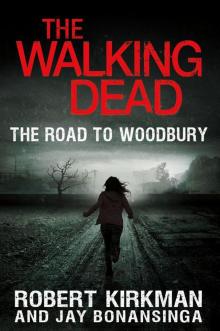 The Walking Dead: The Road to Woodbury
The Walking Dead: The Road to Woodbury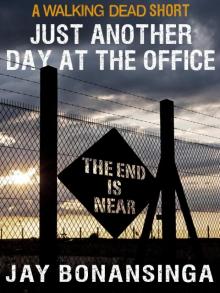 Just Another Day at the Office
Just Another Day at the Office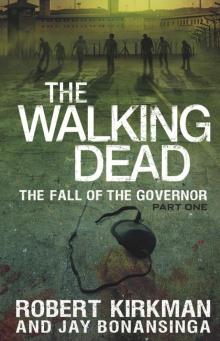 The Fall of the Governor: Part One
The Fall of the Governor: Part One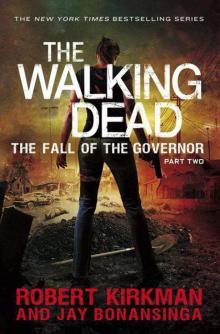 The Walking Dead: The Fall of the Governor: Part Two
The Walking Dead: The Fall of the Governor: Part Two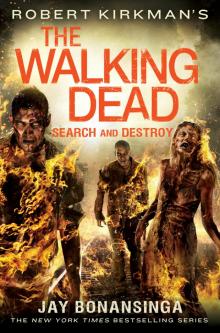 Search and Destroy
Search and Destroy Invasion
Invasion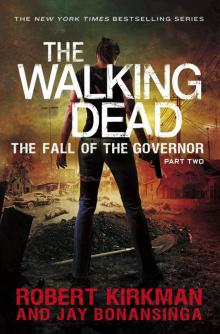 The Fall of the Governor: Part Two
The Fall of the Governor: Part Two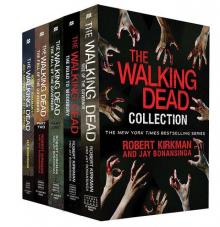 The Walking Dead Collection
The Walking Dead Collection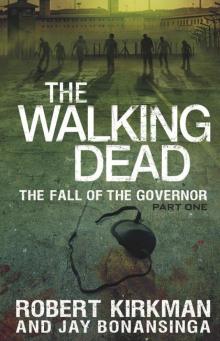 The Walking Dead
The Walking Dead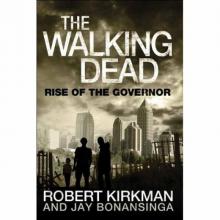 Descent
Descent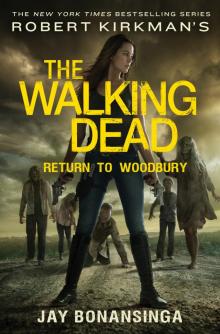 The Walking Dead: Return to Woodbury
The Walking Dead: Return to Woodbury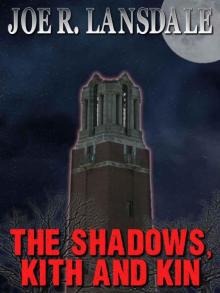 The Killer's Game
The Killer's Game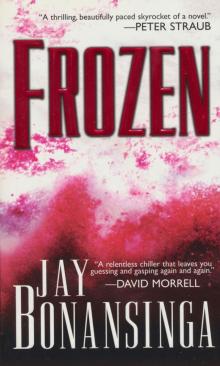 Frozen
Frozen Shattered
Shattered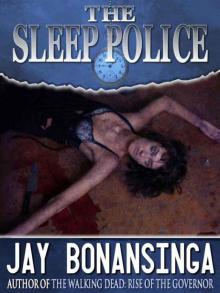 The Sleep Police
The Sleep Police Perfect Victim
Perfect Victim